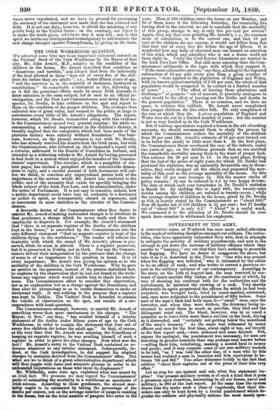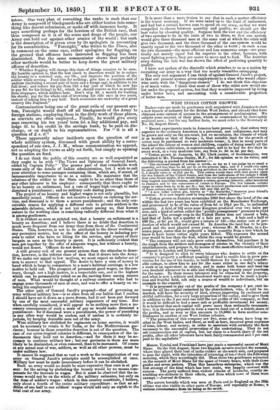GOVEILNMENT OF THE ARMY.
A DISGUSTING scene at Woolwich has once more called attention to the mode of enforcing discipline amongst our soldiers. The autho- rities, who have apparently exhausted their wits, first in attempts to mitigate the severity of military punishments, and now in the attempt to put down the increase of military offences which they ascribe to "leniency," cry out that they have nothing to prescribe but flogging. We have no desire to exaggerate the scene, but take it as it is described in the Times by "One who was present when the flogging was inflicted," who is intimated by the editor to be an officer of rank, and who writes to correct a previous re- port in the military columns of our contemporary. According to the story, on the 15th of August last, the man received by sen- tence of court-martial fifty lashes, at the conclusion of which, by way of showing his contempt both for the authorities and the punishment, he imitated the crowing of a cock. Very shortly afterwards he again perpetrated the offence for which he had been punished, was brought back, tried by court-martial, sentenced, and, once more subjected to the punishment of fifty lashes. Some part of the man's back had boils upon it—" small " ones, says the corrector, and when they were striken, the drummer being in- structed to avoid them as much as possible, they bled and the delinquent cried out. The blood, however, was in so small a quantity as to leave little more than a redline on the back, drying as it descended, and "certainly not getting below the waistband of the man's trousers." As the scene was witnessed by many officers and men for the first time, about eight or ten, not twenty as the first report said,—were sickened and some fainted. But, argues the apologist, the punishment was necessary, for men are deserting in greater numbers than was perhaps ever known before —selling their kits, reenlisting, making a second haul in money and goods; and it may surprise some of our non-military readers to be told, "as I was told the other day, of a man who by this means had realized a sum in bounties and kits equivalent to be- tween 701 and 801." Two other witnesses testify to the fact that soldiers "cheat their captains out of the price of their kits very often."
Let us stop for one instant and ask, what this statement im- plies? Our present military system is of such a kind that it puts a premium upon desertion, amounting in all our forces, naval and military, to 382 at the last report. At the same time the system draws into the ranks such a class of vagabonds, that their dis- orders can only be kept down by a brutal punishment which de- grades the solders and physically sickens the most manly spec- tutors. Our very plan of recruiting the ranks is such that our Army is composed of blackguards who are either beaten into some- thing like decent submission, or make off with immense booty. It says something perhaps for the heroism of the British race, that thus composed as it is of the scum and dregs of the people, our Army can hold out against other armies of the world ; but such is the description of it given even by its apologists in accounting for its eccentricities. "Foresight," who writes to the Times, also in comment on the same case, rather apologizes for flogging, on the ground that offences have increased as flogging has been diminished. But the same commentator shows that probably other methods would be better to keep down the great military offence of desertion.
"Whether flogging will change this state of things remains to be seen. My humble opinion is, that the best check to desertion would be to reduce the bounty to a nominal sum, say 108., and improve the position of the soldier while serving. Feed him for nothing; give him a complete suit of undress (including a second pair of boots and a forage cap) in addition to his full dress ; and reduce his pay from 134 a day (out of which he now has to pay 84. for his living) to 84., which he should receive as free as possible from stoppages, which soldiers hate. Don't stop 24. a month for washing his sheets ; pay for the whole cost of browning his rifle once in two years, instead of asking him to pay half. Such economies are unworthy of a great country like England."
Contamination being one of the great evils of our present sys- tem, Foresight would draft off all blackguards of the Army to foreign stations, employing them in the dirty work of those places, as convicts are often employed.. Finally, he would give every man renewing his ten years' term 24. a clay additional pay, and lodge 51. to his credit in the savings bank, to be paid on dis- charge, or on death to his representatives. For "it is all a question of £ s. cl." These apparently minor incidents open the question of our whole military system discussed with great ability by a oorre- spondent of our own, J. J. M., whose communication we append, not as adopting the views so ably set forth, but simply as opening the question an fond.
I do not think the public of this country are so well acquainted as they ought to be with "The Views and ()pinions of General Jacob, edited by Captain Pelly." The greater part of that remarkable work treats only of the details of Indian administration, but I wish to call your attention to some passages containing ideas' which are, if sound, of immeasurable importance to us as a nation. He maintains that the relations of the soldier to the State ought to be no other than those of any other labourer to his employer : consequently that there ought to be no bounty on enlistment, but a rate of wages high enough to make dismissal a punishment ; and no military code during peace.
The project of no bounty and higher wages is not only plausible, but manifestly sound. Officers do not receive a bounty on entering the ser- vice, and dismissal is to them a severe punishment; and the only con- ceivable reason for applying a different rule to private soldiers is the miserable delusion which is not yet extinct among us, that human nature in the working class is something radically different from what it is among gentlemen.
It is evident as soon as pointed out, that a bounty on enlistment is a bounty on desertion ; and I believe there is no doubt that desertion is much more frequent from our Army than from those of the Continental States. This, however' is not to be attributed to the direct working of any pecuniary motive, but to the effect of the bounty in inducing per- sons to enlist who have no liking for the service and repent of their bargain as soon as the bounty is spent. It is sufficiently evident that men got together by the offer of adequate wages, but without a bounty, would not desert. Officers do not desert.
A still greater evil of our present system than the stimulus to deser- tion, however, is the inferior class of men that it draws into the Army. If we make our appeal to low motives, we must expect an inferior set of men to answer to that appeal. The desire to have a sum of money in hand which is large in comparison to a man's habitual earnings, is a low motive to hold out The prospect of permanent good wages, on the con- trary, though not a high motive is a respectable one, and is the highest which can be permanently relied on as the moving force among masses of men. What would be thought of a railway contractor who had to engage some thousands of men at once, and was to offer a bounty on en- tering his employment ?
The other part of General Jacob's proposal—that of governing an army without military law—is so alien from all our habits that I confess I should have set it down as a mere dream, had it not been put forward by one of the most successful military organizers of any time. But when carefully considered, it will appear to be nothing more than a ne- cessui-y consequence of such a scale of pay as would make dismissal a punishment : for if dismissal were a punishment, the power of punishing in any other way would be useless, and if useless it is certainly in- jurious, by keeping desirable men out of the army.
Were military law abolished for regiments on home service, it would not be necessary to retain it for India, or for the Mediterranean gar- risons ; because in those countries desertion is out of the question. Tha ease of our extra-tropical colonies is different, in consequence of the in- ducements they hold out to desertion,—and for them it may be ne- cessary to continue military law ; but our garrisons in them are more lady to be diminished, or even removed, than to be increased. Of course at any actual seat of war, soldiers, as well as all other persons, must be under military law. It cannot be supposed that so vast a work as the reorganization of our army on General Jacob's principles could be accomplished at once. Military law must be made unnecessary before it can be abolished. Such an army would no doubt be more expensive than ours is at pre- sent : for the saving by abolishing the bounty would by no means com- pensate for the increase in wages. But it must be observed that the in- crease would not be on the whole of the military estimates, but only on the item of soldier's wages : which in this country constitute, I believe, only about a fourth of the entire military expenditure : so that an ad- dition of one half to our soldiers' wages would add only an eighth to the total cost of our army.
It is more than a mere truism to say that in such a matter efficiency is the truest economy. If we were taxed up to the limit of endurance, and had but a certain known sum to spend on our army, so that we were compelled to choose between quantity and quality, we should get the best value by choosing quality. Suppose both the cost and the efficiency of two systems to be in the ratio of two to three, so that one system would give three thousand men at the same cost at which the other will give two thousand, and the three thousand of the one system would be exactly equal to the two thousand of the other in battle; in such a C824 the two thousand—the more efficient and less numerous corps—are prac- tically not merely equal but far superior to the other, because, with equal fighting power, they are easier to move and to feed. The Austrian army during the late war has shown the effect of preferring quantity to quality. I have not spoken of the discredit which attaches to us as a nation by recruiting our army in a way that too nearly resembles entrapping.
The only real argument I can think of against General Jacob's project, is that our present system gives employment to a class who would other- wise unite with the "dangerous classes." I do not think this objection is of much value. I think that most of those who enlist now would en- list under the proposed system, but that they would be improved by living under better laws, rind associating with a considerable proportion of better men.



























 Previous page
Previous page